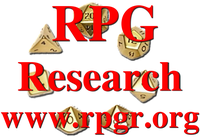Early theory thoughts - Overview
Role playing gaming, when used in a balanced way with “normal” mentally healthy participants, is very beneficial to the participants in a number of ways. When played optimally as a recreational, social, cooperative, heroic manner, participants will show over time and continued participation, increased cognitive abilities, social skills, and have improved emotional state.
A “balanced” level is for the players to participate in the game sessions once per week. I believe this is the “optimal balance” for benefit over time. It is possible more frequent participation (daily) may show benefits in many cognitive areas, but may show deficits in other areas (focus and completion of “drudgery” style tasks and responsibilities) maybe, and may become more socially narrow (more gamer-only socialization and less variety of socialization).
When participants with various disabilities or mental health issues, participate in Role playing games in a controlled and balanced manner, most participants will benefit significantly, potentially helping to develop better coping mechanisms for “real life” in addition to the benefits for “normal” participants.
However, if participants have mental health issues, and the gaming is allowed to become obsessive without structure, the participants may experience negative consequences as they become more immersed in the activity and increasingly exclude their “real life” responsibilities.
Even, “normal” participants could begin to illicit “unhealthy” impacts from excessive gaming participation. I do not know if these negative impacts have any lasting impact when participation is either discontinued or resumed at a more normal/healthy/balanced schedule (about once per week).
In small doses “neutral” and “evil” scenarios might provide some cathartic benefits by letting participants engage in a virtual setting in activities they would not do in real life. Also such settings could be used over time as “moral” learning tools to show consequences in a safe setting to such behaviors. However, long term participation in “neutral” campaigns/characters might contribute to increased seflishness related learned behaviors reinforcement. “Evil” campaigns/characters long term might promote such inappropriate and unhealthy activities in youth to encourage them to act it out more in “real life”. So such settings should be kept to smaller doses. This is just a theory, and research should be done to prove/disprove if these actually have any such effects, and on which groups, if so, and to what degree, and for what duration.
Document Actions

